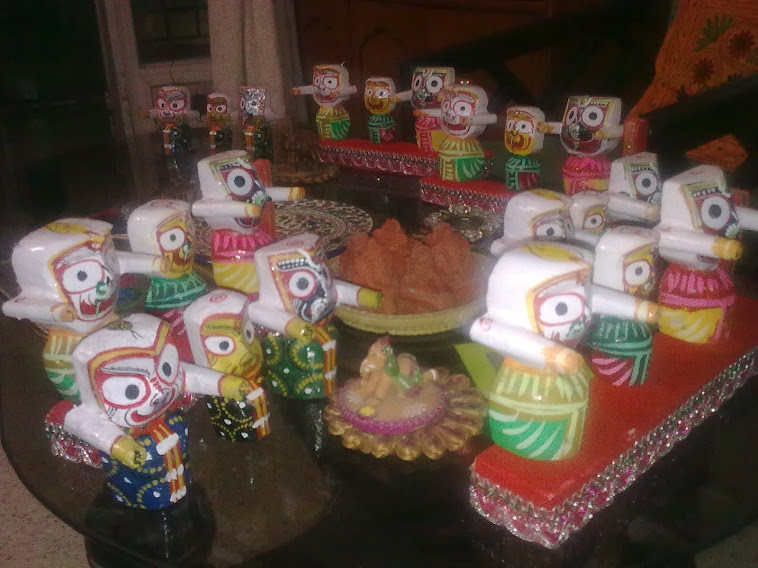
Thursday, December 28, 2006
Publicizing yourself?
While commercially published writers are most definitely accomplished and successful, it would be wrong to dismiss everyone else with a flair for a well-turned phrase.
The fact is, agents and publishers will actually support a few books which make commercially viable sense. If a work or writer has market potential, then there's a ready to advertise and market product.
Such books will definitely have their literary and technical merits. But for each book actually published, there will be many more talented writers with original and well crafted manuscripts whose writing never makes it to the bookstore shelves.
Struggling against the tsunami of commercial validation, our local writers' workshop, Katha Lok, brought out a collection of short stories by members. 'Many Rooms Many Voices' was a collective effort, with writers contributing an affordable sum per published story. We battled shyness and worked together to host book reading sessions in local bookstores, and to have group photo sessions, interviews and reviews with newspapers and magazines.
We tried our best and got encouraging feedback. Yet as simple individual writers, we could not sustain a long term publicity drive. If we spent all our limited time and resources to warm up the market, when would we write?
I still retain a sizeable portion of my personal copies of our book. I never made a profit from my modest initial investment in the venture. Yet all is not lost. A couple of days ago, several years after its publication, I spotted our book in a stall. I don't know how or why it had been placed there among all the fast moving best sellers. We never became rich or famous. But it's heartening to note that readers are still leafing through and perhaps buying our book.
Wednesday, December 27, 2006
Reading wishlist, 2007




Friday, December 15, 2006
When Pigs Fly


"Years ago, I learned that my writer’s group enjoyed my colorful characters, and the more outrageous the better. I also learned that not only could I make people laugh, but it was very satisfying. Along the way, I learned that I am highly unlikely to become a best-selling author. But after retirement from a technical writing career, it seemed like a good time to self-publish my latest novel—it was tremendous fun to write, and I decided that it no longer matters whether some anonymous agent wants to represent it or not. Now that When Pigs Fly has been published by iUniverse, it’s up to me to do all the marketing and publicity—and so far, so good.
The evolution of the title might be interesting. At the beginning, I had a working title, Day of the Dead, which refers to a Mexican holiday honoring the dead. After a while it became obvious that title wasn’t fitting the developing story—What to do? By the end of the first draft, my story involved ashes from a cremation, and several absurdly stupid criminals riding donkeys into the Grand Canyon , a truly spectacular hole in the ground. So a clever friend suggested the title, Asses to Ashes, a pun based on a Christian biblical reference. But in the second draft a pig wandered into the story, sailed off a cliff, wore an Elvis Presley-style sequined jacket, and barged into a wedding. My iUniverse contact thought Asses to Ashes would rub people the wrong way, so I gladly changed the title. "
Thursday, December 07, 2006
Feathers and Fur
 They're almost, but not quite, grown enough to fly off into distant trees. These baby pigeons, my little 'grandchildren', were hatched in an empty flowerpot in our apartment balcony. I don't know why their parents chose this place in a tall building in the middle of the city. But they took little time to make themselves a part of our family.
They're almost, but not quite, grown enough to fly off into distant trees. These baby pigeons, my little 'grandchildren', were hatched in an empty flowerpot in our apartment balcony. I don't know why their parents chose this place in a tall building in the middle of the city. But they took little time to make themselves a part of our family.They stepped into the balcony, pecked at invisible mites in our flowerpots, and then took tentative steps into our rooms. Fluffing their feathers and cooing indignantly at our attempts to shoo them off, these interepid birds went boldly where no pigeon had gone before.
We watched the parents ( I'm sure the parents took turns at it. Very egalitarian birds firmly practicing the equality of the sexes) patiently hatch their brood of two eggs. Around three weeks later, scruffy, almost blind fledgelings cheeped and flapped their bald apologies for wings. The parents constantly fed and tended them until the feathers sprouted and the babies stepped out of their pot onto the balcony floor. Then, they hopped on to a nearby potted plant.
That was when more pigeons got wind of this safe haven. Another pair deposited an egg in the now empty pot. In this picture, the babies look wistfully at their cozy little home, now occupied by a freshly laid egg. These youngsters can't quite fly off yet, but they soon will.
We get other wild visitors to our balconies sometimes. There are several still uncut trees in the vacant land next to our apartments. Monkeys sometimes scamper through the branches in search of food and, um, well, monkey business.
It's easy for these creatures to hop from balcony to balcony till the topmost floor of our building and run off with fruits and shiny objects. One monkey entered an apartment and found no food on the dining table. He then opened the fridge and after a hearty and most messy repast, he spotted a stuffed toy monkey made by the lady of the house. He fell in love at first sight with the toy and eloped with it. The monkey was last seen on a treetop caressing the toy monkey with complete, unquestioning devotion.
Sunday, November 26, 2006
Ah! Kingfisher

 slipped on my sneakers and stepped out onto the concrete driveway that circles our apartments. Enormous dust-bunny clouds smothered the morning sky.
slipped on my sneakers and stepped out onto the concrete driveway that circles our apartments. Enormous dust-bunny clouds smothered the morning sky.
Tuesday, November 21, 2006
Across the Pacific by Raft
 allergies dampen one's spirits more than the drizzle outdoors. The best way to beat that 'under the weather ' feeling is to embark on an adventure. And a good book can be that ticket to a break from humdrum routines. I first read this book in school, and it continues to hold my interest.
allergies dampen one's spirits more than the drizzle outdoors. The best way to beat that 'under the weather ' feeling is to embark on an adventure. And a good book can be that ticket to a break from humdrum routines. I first read this book in school, and it continues to hold my interest. KON-TIKI, Across the Pacific by Raft, is a true story of intrepid explorers. On April 28, 1947, scientist Thor Heyerdahl and five other adventurers sailed 4,300 nautical miles across the Pacific Ocean on a small raft to prove a historical hypothesis behind Polynesian folklore. Legend had it that the South Sea Islands were settled by a mythical hero named Kon-Tiki. Heyerdahl and his team tested this theory by replicating the flimsy log raft used by Kon-tiki’s ancient race to cross the Pacific. After sailing from Peru and braving three months on the open sea, these bold adventurers sighted land – the Polynesian island of Puka-Puka.
KON-TIKI, Across the Pacific by Raft, is a true story of intrepid explorers. On April 28, 1947, scientist Thor Heyerdahl and five other adventurers sailed 4,300 nautical miles across the Pacific Ocean on a small raft to prove a historical hypothesis behind Polynesian folklore. Legend had it that the South Sea Islands were settled by a mythical hero named Kon-Tiki. Heyerdahl and his team tested this theory by replicating the flimsy log raft used by Kon-tiki’s ancient race to cross the Pacific. After sailing from Peru and braving three months on the open sea, these bold adventurers sighted land – the Polynesian island of Puka-Puka. The narrative can get slightly tedious at times, with somewhat repetitive accounts of how fish jumped into the raft and became a meal. The author could also dwell a little more upon the inner lives and thoughts of the men aboard the raft rather than describe the many whales and sharks they encountered on the way. But patiently read the opening chapters, and you will be rewarded with a gripping saga of adventure and courage of men against the wild and dangerous sea. This classic has been translated into sixty-five languages and enjoyed by generations of readers worldwide.
The narrative can get slightly tedious at times, with somewhat repetitive accounts of how fish jumped into the raft and became a meal. The author could also dwell a little more upon the inner lives and thoughts of the men aboard the raft rather than describe the many whales and sharks they encountered on the way. But patiently read the opening chapters, and you will be rewarded with a gripping saga of adventure and courage of men against the wild and dangerous sea. This classic has been translated into sixty-five languages and enjoyed by generations of readers worldwide.Saturday, October 07, 2006
On cabbages, kings, and Mauryan art
I knew little about Indian art in pre-Christian times before reading his Wikepedia piece on Mauryan Art
 The lion capital of Mauryan emperor Ashoka is a beautiful classic example of the sculpture of that era. Time has taken its toll and very few examples of such ancient Indian art survive. The carvings on the walls of the Sanchi Stupa, a Buddhist shrine, are another rare example.
The lion capital of Mauryan emperor Ashoka is a beautiful classic example of the sculpture of that era. Time has taken its toll and very few examples of such ancient Indian art survive. The carvings on the walls of the Sanchi Stupa, a Buddhist shrine, are another rare example.Thursday, September 28, 2006
Time well spent
 During a phase when creativity plays truant, I decided to shrug off inertia and reorganise my cupboards. Among piles of crumbling letters, lonesome single socks, and absurdly out of style dresses, I found a book. It was H.G.Wells' 'The Time Machine', a gift from a friend with whom I had lost touch long ago.
During a phase when creativity plays truant, I decided to shrug off inertia and reorganise my cupboards. Among piles of crumbling letters, lonesome single socks, and absurdly out of style dresses, I found a book. It was H.G.Wells' 'The Time Machine', a gift from a friend with whom I had lost touch long ago.
 Settling into a gap among heaps of unsorted junk, I met the Time Traveller and followed him into the future.
Settling into a gap among heaps of unsorted junk, I met the Time Traveller and followed him into the future.Written a century ago, this novel is as fresh today as the first time I read it. Wells' view of the distant future is anti-utopian. In a satirical take on the social class divisions of his time, Wells foresaw a world where the human race evolved (degenerated?) into two distinct species. The dainty and effete Eloi are descended from the refined, idle aristocracy. The Morlocks are a sinister race descended from the working class, people who spent most of their lives in dark, airless sweatshops and ultimately became cannibalistic animals in the dark underbelly of the earth.
Embarking from the horriffic world of the Eloi and the Morlocks, the Time Traveller enters an even more terrifying future. In the dull glare of a bloated, dying sun, humanity has vanished without a trace. Giant crablike creatures dumbly await the impending end of the world.
Along with Jules Verne, H.G. Wells established science fiction as a serious literary genre. H.G.Wells' 'The Time Machine', 'The War of the Worlds', 'The Invisible Man', and other works are vivid and exciting even today.
Thursday, September 07, 2006
My friend Babar
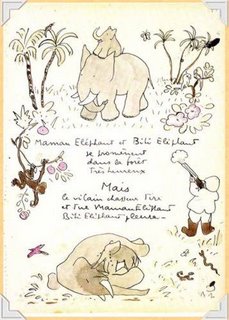 While negotiating my way through Bangalore's busy Commercial Street some days ago, I overheard an exchange between a mother and her young son. To the mother's suggestion to visit a bookshop, the boy replied, "But all they have are the same old fairy tales and Harry Potter." The plump, pale boy typified today's urban children. He probably lived in an apartment and had no trees to climb or grassy nooks to explore. In all likelihood he spent his evenings doing homework and playing computer games.
While negotiating my way through Bangalore's busy Commercial Street some days ago, I overheard an exchange between a mother and her young son. To the mother's suggestion to visit a bookshop, the boy replied, "But all they have are the same old fairy tales and Harry Potter." The plump, pale boy typified today's urban children. He probably lived in an apartment and had no trees to climb or grassy nooks to explore. In all likelihood he spent his evenings doing homework and playing computer games.I, too, grew up in cramped partments in urban sprawls. But my father filled the house with books. Not content with what he found on shop shelves, he ordered more. While my parents were away at work, I curled up in my favourite sofa with Babar, the Little Elephant. Dear, cuddly and muddle-headed Winnie the Pooh and his friends and 'raletions' kept me company through many a lonely day. I loved the delighful river rat, the pompous Toad and all the other creatures populating The Wind in the Willows.
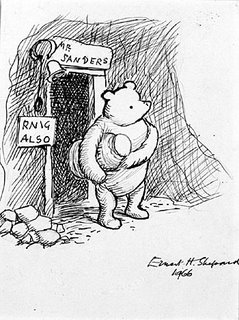
 Exploring my school library led me to more treasures. Call It Courage, books by James Thurber and E.B. White, The Jungle Book, Black Beauty, The wizard of Oz, The Swiss Family Robinson, Tom Sawyer, the memories overwhelm me.
Exploring my school library led me to more treasures. Call It Courage, books by James Thurber and E.B. White, The Jungle Book, Black Beauty, The wizard of Oz, The Swiss Family Robinson, Tom Sawyer, the memories overwhelm me.My son grew up reading my well worn copies of Babar, Robinson Crusoe, Five Little Peppers, Little Women and other books. When he wanted more, I scoured local bookshops in vain for Winnie the Pooh and other old-time favourites only to find the shelves filled with activity books, encyclopedias, fairy tales and classics retold (my child was an advanced reader for his age and would have preferred the originals).And there were the usual bestsellers. Nothing wrong with such books, but I sensed something sadly amiss in the paucity of choices.
Why do commercial interests take precedence in the type of reading on offer to children? Books that 'sell' occupy prominent display space and parents buy them. The same parents later complain that their children do not want to read. When we foist certain books upon children hoping to advance their intellectual capabilities, do we also not stifle their creativity for lack of ample choices? Why not allow them the freedom to make friends with Babar or Curious George?
Friday, September 01, 2006
The Lady turns fifty

Yesterday, TV news channels aired clips of the Prime Minister parrying questions from bright young college girls. The session was part of the fiftieth anniversary celebrations of my alma mater, Lady Shri Ram College, University of Delhi.
I remembered my own college days; dear friends, teachers who encouraged us to delve deeper and ask questions.
I'll quote from the college's website;
"Years ago, while speaking at LSR's inaugural function on31stt July 1956, our founder Sir Shri Ram urged the students and teachers to "set for themselves a standard of behaviour and start good traditions". Faithfully so, the LSR community has not only fulfilled his desire, but has taken it up as a responsibility to promote these ideas to others as well.
Our students have always successfully imbibed in them a unique spirit of community, secular ideologies, a sense of democratic and institutional responsibility and above all the celebration of diversity. LSR has indeed helped all its students maintain a balance between excellence and social responsibility. Nobel Peace Prize winner, Aung Sang Suu Kyi and many many more well known academics, civil servants, social workers, artists, film makers, authors, educationists and lawyers comprise our alumna hall of fame."
No wonder LSR is ranked among the very best colleges in India. LSR ladies, you'll find them everywhere. You'll even find one lurking right here in the blogosphere.
Tuesday, August 29, 2006
Addas in Oxford?
I love the dynamism of the English language. And I love addas, an untranslatable word meaning, well, you know, groups of like or unlike minded folks in freewheeling intellectual discussions about cabbages and kings. The sort of thing that happpens in writers' groups. I would say even Blogspot, with its galaxy of unique voices, is one gigantic adda.
Other Indian inclusions into English are;
bindaas (Hindi) = carefree
chamcha= toady, flatterer, yes-man
chaddi = underpants
yaar = buddy
Saturday, August 26, 2006
A swell surprise
The post went on to say; "Monideepa Sahu (or Moni), always graceful, always kind, is featured at Pindeldyboz with the lovely Mother
Nicer things were in store. References to the San Francisco Bay Area and names of other writers offered no clue until I remembered. Yes, I 'met' Nadine Darling, a talented and accomplished writer, in Zoetrope . We reviewed each others short fiction, swapped friendly Z-mails, and then drifted out of touch. So nice of her to read my published story and remember me.
In a violent and selfish world where those upon whom we shower our affection often turn around to say, 'So what did you ever do for me?', this warmth from someone I have never personally met was amazing.
Friday, August 25, 2006
Sense in Nonsense
 A friend sent me this picture and it reminded me of many people I've known. It also brought back memories of one of my favourite authors, Sukumar Ray, and his collection of nonsense poems in Bengali, 'Abol Tabol'.
A friend sent me this picture and it reminded me of many people I've known. It also brought back memories of one of my favourite authors, Sukumar Ray, and his collection of nonsense poems in Bengali, 'Abol Tabol'.Haven't we all met people who want everything? Well, all Sukumar Ray's Kimbhut Kimakar ever does is whine. Why can't he have wings and fly like a bird? Wow! Look at the elephant's imposing trunk. He must have one just like it. And if only he had the kangaroo's strong legs and could jump so high. On a cloudy monsoon day, he became everything that he wanted to be without even trying. Now he sits worrying. Can elephants jump up high? Can kangaroos live on banana leaves? What if people laugh at a fat old elephant that jumps and flies and sings like a cuckoo? What if someone asks him straight to his face? What can he call himself? "Oh god!", he groans. "I'm not a horse, elephant, snake or butterfly. I'm neither fish, nor plant, nor water, nor shoe nor umbrella. I am nothing then!"
Sukumar's greatest talent was his unique sense of humour. And it found it's best and most unforgettable expression in his Bengali book 'Abol Tabol' (Rhymes Without Reason). He saw the ordinary, boring world that we live in and found in it the absurd and the ridiculous. He turned the most common things upside-down to make his readers laugh. His humour was free from malice. But he did poke fun at the absurdities of human nature and draw from us a frank roar of laughter.
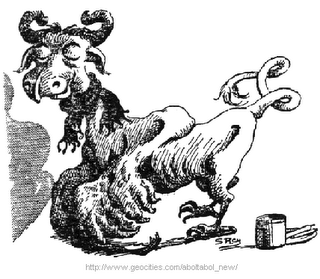
Meet Tansh Garu, sketched by Sukumar Ray himself to accompany his poems. He isn't a 'garu' or cow at all, but some sort of bird. Sukumar's drawings are as compelling as his words, convincing us that these creatures truly exist.
In Sukumar's topsy-turvy world, The absurd coexists with the commonplace and normal. Tansh Garu lives not in some exotic and distant jungle, but just across the street in friend Haru's office.
 There are humans too, in the world of 'Abol Tabol'. Look at dear old Nanda Uncle, the jolly and adorable elder. Where's his endearing smile? He weeps recounting his visit to the astrologer. He has lived happily for sixty years unaware that he would die. But the astrologer predicted his impending death and ruined Nanda Uncle's peace of mind forever.
There are humans too, in the world of 'Abol Tabol'. Look at dear old Nanda Uncle, the jolly and adorable elder. Where's his endearing smile? He weeps recounting his visit to the astrologer. He has lived happily for sixty years unaware that he would die. But the astrologer predicted his impending death and ruined Nanda Uncle's peace of mind forever.And here's Khudo with his miraculous invention, in another delightful sketch by Sukumar. Khudo's eco-friendly machine will solve the world's transport problems. Fit this machine on the laziest fellow, place his favourite snack where he can see and smell it but can't reach it, and you have the most efficient motivator. This machine will help a man run for miles without tiring or complaining.
In Sukumar Ray's works, the spirit of whimsical fun is masked by an apparent sophisticated seriousness. A hundred and nineteen years after his birth, his writing continues to evoke smiles and chuckles.
Sunday, August 20, 2006
writer's quest continues
Selling an article on say, mehendi parties and wedding dresses to a foreign magazine is much, much easier than selling a short story collection or novel. And it's very lucrative. Agents/publishers don't have time for anything but polite 'form rejctions' for works of fiction they they don't want to represent. Those of us who frequent writers' groups have a pretty good picture of what those bland little 'thanks, but no thanks' slips really mean.
But what really raises hope and then makes the writer's heart plummet into the ravines of the Himalayas, is that 'encouraging rejection'. It often happens that an agent or editor likes your work enough to meet you personally and spend her valuable time discussing other ideas. They offer detailed and positive comments on your work and suggestions for changes which you may not agree with. They also offer to see more work from you.
But such 'encouraging rejections', though fewer and perhaps more esoterically valuable for the poor wannabe seeking publication, also can result in nothing.
I keep these rare ones in separate files. works nearly as well chocolates to lift a dismal mood. Here's an exerpt from one I got from an agent in New York;
Dear Monideepa,
I just finished reading your manuscript, and while I like your characters and the story's premise (a spider and rat transform into humans to help a family fight off an evil moneylender), I felt the story was too complex for your audience (ages 9-12 or maybe younger?). I liked the worlds of the story, but I found the treasure hunt difficult to follow and unnecessary: even though the rats needed gold to pay off the moneylender, in the end they got rid of him another way. The most interesting moments in the story are the relationships between the insects, rats and kids and the secret animal/insect worlds (original and fun).
When you're ready to write a new novel, you might like to look up some of the animal/insect novels on BN.com. Here's one search. If the link doesn't work, I gave you steps on how to get there.
Here you'll find synopses of featured titles in the trade market, sorted by publisher. You should be able to get a sense of the types of books they publish and where your writing fits in the marketplace. A follow-up visit to publishers’ web sites will yield further insights and lead to a new kind of focus in your writing—more to a publisher’s way of thinking.
Monideepa, thanks again for giving me an opportunity to read your novel--I enjoyed it and hope to read more of your work in the future.
Sincerely,
Debbie
****
As the PenguinIndia editor told me, and as Debbie the agent stresses at the end of her note to me, market forces play a big role in selecting works for publication. I subsequently learnt from other children's fantasy writers that, since there are already a spate of successful books in this genre in the market, publishers/agents aren't keen on trying out works from new writers at the moment.
Right timing and good marketing strategies matter. Nearly as much as polishing your writing to make it the best it can be.
Saturday, August 19, 2006
Independence Day and Janmashtami
An Englishman living in Bangalore wrote a letter to the editor. He felt that development and prosperity meant a lot more than an outcrop of swanky malls and high-rises. I totally agree. Everyone and their envious neighbours are buying bigger and more fuel guzzling and exhaust belching cars. People jostling for limited road space, everyone in a hurry to elbow others out of their way, road rage. They push unfortunate pedestrians into the spaces between gutters and construction material heaped on what used to be pavements. All, perhaps, for the freedom to acquire more, more, more.
On 16, we celebrated Janmashtami, the birth of Lord Krishna. A friend saw a stream of complicated and critical cases pouring into their hospital's labour wards; high risk cases which were beyond the capacity of smaller nursing homes and health centers. The friend returned home a bit past dinner time, exhausted but jubilant. In such difficult cases, it is not uncommon for the babies to die along with their mothers despite doctors' best efforts.
But on Janmashtami day, all of them survived and are on their way to complete recovery. For us this was the best celebration.
Saturday, August 12, 2006
What writers want
She was very polite and businesslike, particulalrly liked one of my ideas, and I went ahead and wrote a novel. She saw it, said nice things, and I felt on top of the world, dreaming BIG dreams.
but...It wasn't good enough fo them to buy the book. She explained
 privately that promoting new writers was extremely tricky. I got the distinct hint that especially if a writer wasn't into the arty party circuits and knew everyone who matters, people will wonder who the heck is this and not take interest in a nobody. If a writer is already well-known, it is that much easier to proftably sell his books. Bottom line: marketing and profits count. Unless a new writer can make a particular editor fall in love with his work, it won't get published. A very iffy business on the whole. Unknown writers like me are poor business propositions.
privately that promoting new writers was extremely tricky. I got the distinct hint that especially if a writer wasn't into the arty party circuits and knew everyone who matters, people will wonder who the heck is this and not take interest in a nobody. If a writer is already well-known, it is that much easier to proftably sell his books. Bottom line: marketing and profits count. Unless a new writer can make a particular editor fall in love with his work, it won't get published. A very iffy business on the whole. Unknown writers like me are poor business propositions.To me it seemed like the chicken or egg conundrum.
She did like my work enough to try to put me on to translating childrens stories, and I worked on some of her sugestions. But nothing came of it. Basically, all publishers look at the business side and after much writing and discussing, no deal may come through.
At this stage, I decided to stop writing things to 'fit in' to the needs of publishers. Now, I write about what I feel like, where my heart leads me. Not expecting to make megabucks or waiting for the biggies to come flying with gilt edged contracts to my doorstep. Not because I don't need money. We're simple middle class folks. But I feel I've slogged in the rat race long enough, so I deserve a bit of personal freedom. So if an editor/publisher likes it, fine. If he doesn't, I never expected anyone to.
I know many talented but
 unknown writers who are nothing of consequence. As yet.
unknown writers who are nothing of consequence. As yet.I feel everyone starts at that point. Luck and hard work determine where they go from there
This is where I am right now, refining my writing to make it the best it can be and searching for an audience. The story continues.
Wednesday, August 09, 2006
A Gandhian Passes
Tucked away in a quiet, tree-lined lane in Bangalore's Kumara Park, is a spacious compound with many large trees. Inside, there are some simple cottages recreating a typical a village setting. This is a home for the aged and orphans. Upon entering, I was greeted by a fair, aged lady wearing a white sari, conversing with a younger lady in saffron. "Was this ashram really blessed by Acharya Vinobha Bhave?" I asked, pointing to a plaque.
"Oh yes. I was his sevika, and a freedom fighter", said Mahadevi Tayi, the lady in white. "See, there's my photograph on the wall, along with Acharya Vinobhaji, and Pandit Nehru."
"It's all like a story now. I was young and full of energy. Now I'm ninety-four,"Mahadevi Tayi continued. "Those were heady days. Every heart was filled with idealism and patriotic feelings. Gandhiji was a great leader, who called everyone to do non-violent satyagraha against oppressive British rule. I grew up in Wardha under his influence. The young and old, women and children all enthusiastically joined the Freedom Movement.
"At first, the women were shy, but they gained confidence to do satyagraha. Many women were imprisoned along with their husbands. Their property was confiscated by the British, leaving the children destitute. I ran an ashram for three hundred such children, hiding my work from the British government. I was jailed for this, and on three other occasions as well. I even underwent rigorous imprisonment with criminals, and solitary confinement. But we had the courage to withstand hardship, and sacrifice our personal comfort for the sake of our country.
During the Razakar Andolan in the princely state of Hyderabad, Vinobhaji was called. Vinobhaji went on a padyatra in rural areas for fourteen years. Many men and women from all parts of the country followed him. I was constantly by his side. Vinobhaji saw wide disparities among the rich, landed people, and the poor, landless peasants. Vinobhaji asked the rich to donate land for distribution among the poor. This was the Bhoodan Movement."
Channamma Hallikere, the lady in saffron, had her own story to tell. "As freedom fighters, my parents were imprisoned many times. As a one-year old baby, I stayed in Dhulia jail with my mother. When my parents were jailed, the British confiscated our property. I now live in Vinobhaji's ashram in Wardha. He started this ashram for uniting women workers. It is a community of women, including foreigners, living together in cooperation and harmony as brahmacharis. I conduct three-day camps for people in rural areas, helping them and spreading the teachings of Gandhiji and Vinobhaji in Kannada. I have been doing social work for fifty years."
"Helping and encouraging the people in the ashram keeps me busy", said Mahadevi Tayi. "Nobody is destitute or anath. God is everyone's nath."
Wednesday, August 02, 2006
Burichang and Kudutai
 Long ago and far away, my forefathers had a homeland; a sylvan paradise which they left forever after India was partitioned. My elders told dreamy stories about a lost Arcadia of milk, honey and communal amity. That home was a village called Burichang.
Long ago and far away, my forefathers had a homeland; a sylvan paradise which they left forever after India was partitioned. My elders told dreamy stories about a lost Arcadia of milk, honey and communal amity. That home was a village called Burichang.Burichang has grown into a sub-divisional town in Comilla District now, in a foriegn country named Bangladesh. My uncle visited there recently and told us how the family home now houses governement offices and a school.
Born in free India, growing up in capital cities like New Delhi and Washington D.C., I listened with incredulity to what seemed like fairy tales of a lost Eden. I never lived in a real Indian village, never visited one until I did my rural and agricultural banking postings as a probationary officer with the State Bank of India group.
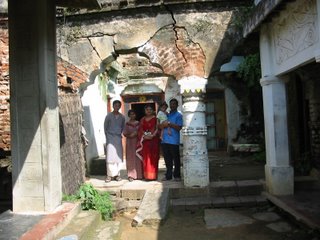
I finally inherited a genuine rural address by marriage, village Kudutai, dist Ganjam, Orissa. The emerald paddy fields and groves of cashew trees with luscious red cashew apples, the undulating hills, yes, this is a paradise on earth.
The now crumbling ancestral mansion still displays signs of old grandeur in the massive decorated pillars and ornamental doorways. These were once scenes of community festivities, of village panchayats and dispensation of justice.
The old mansion now lies abandoned, like the beached body of a magnificent whale.
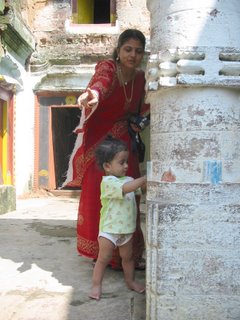 Descendants of the clan live in featureless matchbox quarters with modern amenities huddled behind the grand facade of the original house.
Descendants of the clan live in featureless matchbox quarters with modern amenities huddled behind the grand facade of the original house.Seeing the beauty of Kudutai, I now understand what my own parents and elders still mourn. I also see that it is no unspoilt paradise. Kudutai is an ordinary village in a remote corner of a less developed state of India. Electricity came here only at the fag end of the twentieth century. A few months ago, a young cousin died of cerebral malaria. There are no doctors or hospitals in the village.
The younger generation of the family are now entering into service oriented professions. Idealism can also motivate.
Tuesday, August 01, 2006
Exchanging critiques and Igniting friendships
Sometimes friends return after a long absence to share disconcerting news. I felt so sad when Deepa wrote in to say;
"our home along with all other buildings in our area for a 20 km stretch -- homes, shops, hospital, schools, temples, bank, industries, etc. is going to be demolished in 2007 as the govt. has decided they want to expand the highway! This would displace over 100,000 people and render at least another 100, 000 unemployed apart from breaking up families as some have to stay on in the area due to the jobs while others have to move.
And there are moments of pure fun like when Beth returned up after years, now as the happy mother of a baby girl. We plunged into a critique exchange and a heated discussion on a shared passion for hot chilies. We use a lot of the stuff , call them chilies or mirchi in Hindi. In my own mother tongue, Bengali, they're called 'lanka', not as in Sri Lanka, but well...A Chili by any other name is just as fiery.
Beth tells me about her home, New Mexico, "where chile is not just a food, it's a way of life... When Green Chile Season rolls around (September usually), everyone buys their big bushel sacks full of chile and spends an afternoon roasting them on the grill, drinking beer, and eating bits of roasted green chile rolled in tortillas. The smell is amazing and the whole harvesting season is something everyone looks forward to all year long.
In New Mexico, "chili" refers to the stew-like concoction of beef, beans, onions, spices, etc.
More than you ever wanted to know about New Mexico chile! Can you tell I'm passionate about it? "
This is how we share stories, and discover newer ones.
Sunday, July 30, 2006
Prince and reality TV
As we watched Prince emerge from the pit in the arms of brave army men, I couldn’t help but wonder. Were we, the TV viewing public, like spectators at a circus watching the action from the ringside? It seemed as though competition caused the numerous TV channels to seek out and create yet more spectacular news. After all, the audience could take only so much non-stop excitement over yesterday’s bomb blasts and tsunamis, and ratings would plummet unless fresh headlines dazzled. Were the news channels showing adequate sensitivity when they intruded into the personal trauma and ultimate victory of a brave little child? Were we voyeurs who, sated with the plethora of entertainment shows, craved the thrills of prying into the personal tragedies of others offered by ‘reality TV’?
My son says such media exposure has positive results. Financial and other help is pouring in for Prince. In fact, rescue efforts might have been abandoned after initial setbacks, if the whole world and their cousins were not watching and praying. Media attention will hopefully prevent the recurrence of official negligence, which led to this awful incident.
So Prince had his moments of tragedy and glory. May he enjoy many long and fruitful years of life. Let us praise the Divine, the Army and the media, and then grab bowls of popcorn and surf channels. Don’t want to miss the next breaking news of a plane crash or serial bombings.
Friday, July 28, 2006
Malls as literary outlets

Malls are cropping up all over Bangalore. Huge crowds gawking at window displays, teenagers hanging out, hardly places to reflect in calm solitude. But it can be done. Well, not exactly in tranquil surroundings and certainly not in a totally reflective mood.
Some years ago, several of us women writers from Bangalore got to know each other through our published articles. Friendship blossomed and we decided to call ourselves 'Inklinks'. We come from different religious and linguistic communities. There are teachers, professional counselors, a doctor and a painter among us.
Cubbon Park was a great place to club an outing with literary criticism, until the ants took a fancy to Dr. Eva Bell's yummy cakes. They bit poor Eva, perhaps hoping she would bring bigger helpings for them next time. There we are in Cubbon Park. From left to right, Nalini, Dr. Eva Bell, Vathsala, Malathi, and Prema. I took the pic so you see my bag in the foreground. Other members, Lakshmi, Anuradha, Khurshid, and Kamini Williams aren't in the picture, but are very much part of the group.
We disappointed the fire ants of Cubbon Park by supporting Dr. Eva and seeking a safer place. We were pretty skeptical when Nalini and Malathi proposed a centrally located mall. But the rooftop food court proved to be a calm place during slack hours.
We met yesterday, shopped, caught up on gossip, ate waffles and sandwiches, downed strong filter coffee and... Yes, we discussed writing and stuff also.
We have many short stories ready and are serious about bringing out a joint collection. We've received much encouragement from the Times of India folks, who aired a short clip of one of our meetings on their national news channel and published an article about us in their pages.
Thursday, July 27, 2006
Verbal aggression and 'strong' language
Overuse of strong expletives tends to annoy and upset me. It may be 'cool' or 'fun' upto a point. But foul language tends to lose its impact if used indiscriminately and frequently. They become just a lot of words used, IMHO, by people who lack imagination and frankly dont care about expressing themselves more appropriately and effectively. They don't make much sense and seem to me like so much jargon or gibberish.
If certain individuals choose to pepper their speech with dirty words, we as writers do not need to emulate them blindly. We can and should use our discretiton and explore more creative avenues for expressing ourselves. A writer can use gutter language when it fits a fictional character or situation. We need not avoid real issues and be coy. But I don't see much point in using vulgar words and phrases everywhere, certainly not as a statement of literary style. That purpose would be better served by the immense power of the understatement, by imaginative and innovative use of metaphors etc. That is the way we can show our creativity, not just by repeating a stream of hackneyed, overused bad words.
I also see that I could write a (hopefully) sensible post without using a single 'cuss' and I also see that I had to think harder instead of blindly using words that, by overuse, have become trite and banal.
Monday, July 24, 2006
The Well of Snakes
I've spent my entire life in the congestion of urban clusters. So I'm drawn to fresh air rustling through trees, the calls of birds, and wide open spaces. There's such a sprawling forest area just seven kilometers from our apartment in Bangalore. On holidays, we sometimes drive down and take a morning stroll through the wooded area, which is home to the Bangalore University campus. This area is called 'Nagarbhavi' in Kannada. It means, 'the well of snakes'.
Often, things I encounter in ordinary daily life form the kernels of stories. This forest campus too, has led to a story (link in right sidebar). The hundreds of acres of forest land is gradually giving way to buildings for more university departments and institutes. But there's still long stretches of trees and scrub, through which the roads wind to and from the city.
They've cut away some of the indigenous vegetation and replaced them with groves of eucalyptus now. But the babools, date palms, mango trees and the butterflies still thrive. Among the sweet chirps, coos, and twitters, I can recognize the cuckoo and sparrow.
By the roadside in the middle of the forest, a man sells juices of herbs and fruits to morning walkers. I ask for a mix of everything he has; margosa, mint, cucumber, bitter gourd, black grape, tomato, radish, other green liquids he chooses not to describe, but which smell refreshing anyway. He seasons my glass with a drop of garlic juice, and I quaff the slightly bitter, leafy smelling drink. All for a princely six rupees.
This gentle Eden has hidden dangers. I halt abruptly before a huge black scorpion flattened by some speeding vehicle on the tarmac. It still looks vicious, its black body at least eight or nine inches long. There are snakes too, some harmless but others not.
I stop by an anthill on the top of a slope for a view of the city. The rising columns and spires of the anthill teems with busy creatures who build yet higher. I stare at the expanse of buildings below me, boxlike independent houses, clusters of apartment buildings like ours, and farther off on the horizon, the towering high rises of the city's business district. So many cars and buses carrying busy people everywhere.
But the day's work awaits. I don't have time to wonder.
Tuesday, July 18, 2006
Commuting in Mumbai
Mumbai's commuters knew all about multi tasking long before management gurus extolled its virtues. Women in the second class ladies' compartments caught up on domestic chores on the way home. They usually reached their suburban homes very late, and every minute mattered. The enterprising ladies knitted, sewed, and even peeled and chopped vegetables for dinner. Vendors entered the compartments and sold everything from fresh fruits and vegetables to hairbands and cosmetics.
Two incidents linger in my memory. One morning, my train halted a furlong from the Churchgate Terminus platform. It was quite a height to jump off, so I waited, hoping the train would start again and take us to the platform. But as office time neared, the more intrepid among us girded their sarees and tied their dupattas, took off their shoes, and took the plunge.
As the minutes ticked by, I remained one of the timid few in the stationary compartment. I peered down yet again at the height I must jump, and faced the exciting options of risking a broken ankle and arriving late at work.
"Don't be scared." A voice startled me by its sweetness. "Hold my hand, close your eyes and just jump."I stared at the owner of the outstretched hand, a slim young woman with an exuberant afro hairdo. Her rich dark skin had a hue not commonly seen among Indian women. In the moments I took to overcome my awe of her beauty, she turned proudly on her heels and disappeared among the crowd.
I guessed she was an African, probably a student at the nearby Bombay University. I wanted to reach out to her, to tell her that if people were taken aback by her exotic looks, it did not necessarily imply racism.
On another drizzly monsoon evening, I emerged from Andheri Station and frantically hailed reluctant autorickshaw drivers to take me home to our apartment. My savior finally arrived, a natty young driver dressed like the reigning Bollywood superstar.
As I entered the auto drenched and shivering, he cut me short by announcing, "donÂ't tell me where you want to go. You don't remember me?"
No, I did NOT!
"You're famous," he continued. "You look for autos around this time every evening. We all know you. We know everything about you. I know exactly where to take you, so just sit quiet and don't bother giving directions."
Who was he? A stalker or a hit man from the underworld perhaps? I shivered in the speeding auto while he regaled me with ceaseless chatter. Should I jump off at the next traffic signal and bolt? Or should I wait and watch? He hadn't taken out a gun or dagger yet, so maybe...
True to his word, he brought me right till the entrance to our housing society without my needing to give a single direction.
"So which one is your building, ma'am?"
"You can drop me right here, thanks. I'll need to pick up a few groceries here, so..."
He stopped, I got down, paid him and watched him sputter away down the street.
Monday, July 17, 2006
Commercialization and popular media
I keep meeting folks who dismiss this kind of reading as ‘utter crap’. So why are these publications seen and read just about everywhere?
The criteria for judging writing as trash is purely a matter of perspective. Those who love the popular magazine type of fare with their morning cuppa may dismiss my writing as so much paper fit to be rolled up by the toilet side. One man's meat being another man's poison, blah blah, yadda yadda.
That apart, the secret to the success of such publications is advertising sponsorship. Don’t miss the never ending cornucopia of 'articles' in such papers, which eternally harp on the benefits of certain lifestyle products like wine, botox treatments, etc. Take any popular commercial publication. They cater in varying measures to commercial lobbies, whether for promoting beauty or lifestyle products, or other consumerist fare.
Botox and sugar substitutes are perfect examples of what I’m talking about. Doctor friends tell me that these substances can be downright harmful. The label on a popular sugar substitute prominently displayed on local supermarket shelves reads; endorsed by WHO studies. What the label doesn’t say is, which year that study was undertaken, and whether there were subsequent studies not only disproving those claims, but also showing some dangers in continued use of the product.
So do you get my point? The manufacturers of such products have their lobbies and push, directly and indirectly, to have their products 'endorsed' by 'experts' in articles. Articles targeted at suckers with fat wallets who flick through a popular glossy magazine while being chauffeur-driven to work.
Similarly, the photos of the evening's happening events (read pubs, bars, restaurants) would probably have a deeper significance. Offer the media persons their beer and freebies, some other benefits to the publication, and you have some lovely, convincing indirect advertising.
A win-win situation for all concerned. Even for you, because you get so much extra paper to line your kitchen shelves and sell to the raddi walla.
IMHO, the magic of popular publications is to dumb themselves down to appeal to the masses, who constitute their huge readership and also keep the advertising-consumerism chain rolling.
The 'low level' articles with surrogate advertising appeals not only to the mass readership, but also very much to the advertising lobbies and the newspaper itself. It is they (the advertisers) who pay for the newspaper we get.
The actual cost price of the daily newspaper would be around Rs 10-15 but we pay only 2-3 rupees. The advertisers bear the burden, and that is why the managements of papers support them.
As for 'high level' writing, I wrote this 4k word long literary story about a guy who collects newspapers (ten years' back copies) as a means of coping with personal tragedy. That story is doing the rounds, getting very encouraging feedback from editors, but it is still unpublished.
If I write another article extolling the virtues of botox treatments (which doctor friends tell me might cause more harm than good, besides being frightfully expensive) the article will be lapped up and I will be paid for it.
That is the system. Money talks.
An American writer friend tells me things are not much better with the consumerism driven mass media in her own country.
The fact is, give people the world over their pubs, malls, fast cars and movie gossip, and they are too happily engrossed to care for much else. Those concerns are best left to the miniscule minority of 'losers' who probably live in ivory towers or idealistic erewhons.
IMHO it always has been, and probably always will be like this. Most people will accept anything that is fed to them with a spoonful of sugar or money. It is difficult to think, harder still to think in a sustained and sustainable manner and dig deeper into things. It also doesn't pay ;-) so even some of the few who can, do not care to.
I am not being judgmental. Money drives the world. Many of us here scream ourselves hoarse because writers are not being paid enough. Many of us seek money, and consider only getting paid well a mark of success.
Similarly, money drives what is being published, what is being dished out to the consumer. Oops, sorry, reader. We consume/read whatever someone chooses to subside for a commercial purpose.
The popular publications and other forms of mass media do not care for, are not looking out for, serious investigative work or serious literary work.
Nobody paid Vincent Van Gogh for his art, though he is today, long after his death, considered one of the all time greats. But the ad whizzes get paid piles for all those brilliant, cool, sexy ads which sell more shampoos, luxury cars, soaps.
Nobody pays those who try to create art with words. But you DO get paid for churning out reams of not all that well written or intelligent stuff which sells, to consumer /readers, a certain lifestyle. Popular mass media basically needs an endless stream of ‘copy’ to accompany those glossy ads on the adjoining page about snazzy cars, beauty products, botox, etc,
The media needs and encourages articles which will appeal to the reader without taxing him intellectually. The article must not outshine those masterpieces of artistic creation; THE ADS.
What is mass produced is a total package of articles/stories and ads targeted at the reader who will drool over the glossy pages and rush to buy more, more, more.
Entertainment, dumped down to cater to the needs of various consumerist lobbies, SELLS.
I say this having written nearly a hundred articles for various commercial publications. It was fun while it lasted, but I don't do it any more and choose to remain 'invisible.
Guess why.
Saturday, July 15, 2006
In God's Own Image
In this terror-ridden world, while some are searching for peace and justice and others for more efficient techniques of large-scale mayhem, we have performed a miraculous journalistic scoop. Our colleague, who prematurely left us thanks to one of the countless bombs blasting the planet, has managed this exclusive interview with the Almighty Himself.
Over to the Supreme Creator:
The Lord is frantically polishing His huge signboard in a last ditch effort to restore pristine lustre to His tarnished name. A frown of annoyance disturbs the eternal tranquility of His noble visage, as Ishwar, Allah, Jehovah, God Almighty, or whatever believers of different faiths choose to call Him, answers our departed colleague's queries.
DH departed reporter: Lord, they say your divine hand is behind everything in this world. Then why this evil and destruction?
God: I created men with free individual wills. So why shirk your responsibilities and pass the buck for your misdeeds on to me? Why ME?
DH: Lord, the people causing the terror say they are doing it in your name. They even expect you to reward them in heaven.
God: For the last and final time, I have always commanded people to love their neighbours. Where have I ever advocated killing innocents? Tell me, which religion advocates hate and destruction?
DH: But Lord, you are the Almighty. The world is looking to you for answers.
God: These horrible perverts have gone berserk. It's true. I did create man in my own image once…(chokes, holding back tears. Then clearing His throat, speaks again)
I gave them the noble gift of intelligence and reason. I let them have free will, wanting them to be a line of defense against the forces of evil.
Today they have turned the tables against me. They are misusing their divine gifts and reinventing me and my teachings in their corrupt image. Such is the power of misconceived faith. You murderous scoundrels, stop this nightmare at once! I command you...Love each other, be good and just and kind.
Listen to me. Why make me the scapegoat? …Please…listen. Spread love, not destruction.
(God faints and is carried away by heavenly attenders)
Why Mumbai?
Everyone blogs, and maybe that's why I didn't do it until now. Maybe I'm just too shy. Maybe because I felt that people will ultimately notice good work.
But today, I'll start by adding my voice to the cries of many who are moved by the bombings in Mumbai. I lived and worked in Mumbai for several years. It's a city I love, a place where no one is made to feel like a stranger.
Except for increased security at important places, my own city, Bangalore, seems to be quite normal till now. But these blasts have really rattled the people of Mumbai and all Indians. We are now hearing from friends and acquaintances. My own relatives in Mumbai are all safe. But distressing news is trickling in from other quarters. Our former neighbor's, who moved to Mumbai some years ago, have both (married couple) died in the bomb explosions.
There is some finer distinction between natural disasters like earthquakes and tsunamis and man-made ones. Natural disasters are inevitable; fate or the hand of God for those who believe in religion. But when innocents die at the hands of evil humans (?) these barbaric acts of terrorism take on a new and more sinister dimension.
At such times, I prefer to focus upon the innate goodness of ordinary people.
I still remember how my fellow commuters in Mumbai showed touching sparks of warmth and humanity despite the impersonality of mega city rush hour crowds.
At that time, I was in charge of my bank's vault and all keys to the office and everything in it, which was quite a lot of valuables. As usual, I carried the keys in my purse and rushed after work to Churchgate station. I normally went in the separate ladies' compartment, but that evening, the ladies compartment was jam-packed, while some of the general comparmtments had plenty of free seats. So I took a window seat in a general compartment and enjoyed the view. The train passes the seacoast and many parts of the city. The skyline is impressive.
But when the train was nearing my station, I realized that I just couldn't penetrate the wall of men and get off. There were too many people, no space to even place my foot on the floor, let alone move ahead towards the exit. Mumbai's trains carry millions of commuters daily, so one can only imagine the density of the rush hour crowd.
I had several fears. Someone could easily steal my bank keys, a terrible thing. I could lose my job for it and also face a police case considering the amount of money etc involved. Dereliction of duty and everything.
If I missed my station, I could also be hauled up for ticketless traveling since my ticket wasn't valid for the next station.
And I was afraid of being jostled by so many men, at least a hundred of them breathing down my neck. I was just 26 then, young and nervous. But they were so good. When I began requesting them to make way, some of them asked whether I was new to Mumbai? Didn't I know that general compartments would be like this during peak hours?
The men pushed me ahead gently and helped me get off at the right station .All of them made way for me with so much politeness. And an added, 'Always take the ladies' compartment, ma'am'. Not one of them touched me improperly, and I was really grateful for their help. These people were from different religious and linguistic backgrounds. But that didn't matter, as it still doesn't matter to most of us Indians. But I guess horrible incidents like this do tend to raise tempers and reduce patience levels among those directly hit.
This is just what the terrorists want, and we mustn't let them have their way.
During this disaster, the same people who helped me in the train, are coming forward to help the injured and stranded. I salute their spirit.


